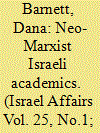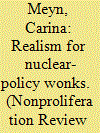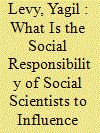| Srl | Item |
| 1 |
ID:
164325


|
|
|
|
|
| Summary/Abstract |
This article reviews the writings of post-Zionist, neo-Marxist Israeli academics, and the way they have contributed to blurring the line between legitimate criticism of Israeli policies and actions and classical and/or new forms of anti-Semitism. By way of doing so, it will describe the paradigmatic shift in the social sciences and humanities that has given rise to the phenomenon of academic anti-Semitism; analyse the writings of neo-Marxist Israeli scholars with an emphasis on anti-Semitic themes in their writings; and look at the extra-mural criticisms made by Israeli academics and the unwillingness of many universities to confront them.
|
|
|
|
|
|
|
|
|
|
|
|
|
|
|
|
| 2 |
ID:
160988


|
|
|
|
|
| Summary/Abstract |
In the United States, the nuclear-policy community considers the realist school of thought the gold standard of analytical excellence. Sometimes equated with theories of nuclear strategy and massive retaliation, sometimes with the inter-war intellectual debate on how to respond to the rise of fascist militarism in Europe, the distinction between realism and idealism effectively predetermines the positions and analytical arguments available for a new generation of policy professionals. This, in turn, leads to a repetitive and theoretically stale debate between the nation’s foremost experts on technical and ethical matters of national interest. In order to stake out a new conceptual baseline for future policy discussions, this article suggests that it would be useful for nuclear-policy analysts to reacquaint themselves with the content and rhetorical strategies of classical realism in order to, firstly, enable a more humble and sociologically oriented form of nuclear-policy analysis and, secondly, make possible a new substantive debate beyond the narrow confines of neorealism on the one hand and classical nuclear strategy on the other. In making this argument, I am combining insights from my own ethnographic fieldwork among Washington’s nuclear-policy elites, recent contextualist scholarship on classical realism, and critical theoretical analyses of the deeper social forces shaping US nuclear-policy making.
|
|
|
|
|
|
|
|
|
|
|
|
|
|
|
|
| 3 |
ID:
188786


|
|
|
|
|
| Summary/Abstract |
Mainstream scholars of IR favor policy-relevant research, that is the agenda to influence government policymakers by offering policy recommendations. In this article, I offer a different perspective by presenting alternative arguments about social scientists’ responsibility to influence. By drawing on themes of public sociology and critical sociology, security studies and public policy, I argue that the core of this responsibility is to seek to influence policy via engagement with the public rather than with policymakers.
|
|
|
|
|
|
|
|
|
|
|
|
|
|
|
|